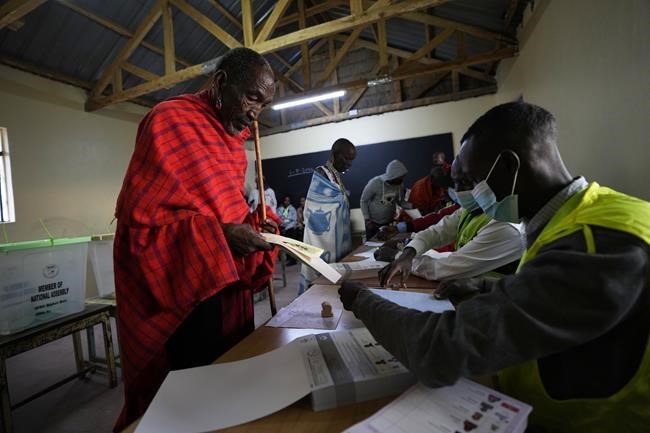NAIROBI, Kenya (AP) — Polls opened Tuesday in Kenya's unusual presidential election, where a longtime opposition leader who is backed by the outgoing president faces the deputy president who styles himself as the outsider.
The election is considered close, and East Africa’s economic hub could see a presidential runoff for the first time. Economic issues could be of greater importance than the ethnic tensions that have marked past votes with sometimes deadly results.
Hundreds of voters lined up hours ahead of polls opening in some locations, often after being summoned by volunteers' early morning whistles. Voting started late in some areas as materials or polling workers were delayed.
The top candidates are Raila Odinga, who has vied for the presidency for a quarter-century, and Deputy President William Ruto, who has stressed his journey from a humble childhood to appeal to millions of struggling Kenyans long accustomed to political dynasties.
“In moments like this is when the mighty and the powerful come to the realization that it is the simple and the ordinary that eventually make the choice,” a smiling Ruto told journalists after becoming one of the first voters. “ I look forward to our victorious day.” He urged Kenyans to be peaceful and respect others' choices.
Outgoing President Uhuru Kenyatta, the son of Kenya’s first president, cut across the usual ethnic lines and angered Ruto by backing longtime rival Odinga after their bitter 2017 election contest. But both Odinga and Ruto have chosen running mates from the country’s largest ethnic group, the Kikuyu.
The 77-year-old Odinga has made history by choosing running mate Martha Karua, the first woman to be a leading contender for the deputy presidency. “Make your voice heard,” she said after voting early in a knitted cap, a sign of the unusually cold weather in parts of the country.
Rising food and fuel prices, huge government debt, high unemployment and widespread corruption mean economic issues are at the center of an election in which unregulated campaign spending highlighted the country’s inequality. But personalities still matter.
“We need mature people to lead, not someone who abuses people. Someone who respects elders,” said 55-year-old teacher Rosemary Mulima, who arrived with friends at a polling station on the outskirts of Nairobi to find an estimated 500 people in line before dawn. She had “very high” hopes for Odinga on his fifth try,
Others predicted a lower turnout than the 80% five years ago and blamed voter apathy.
“The problems from 2017, the economy, the day to day life, are still here,” said 38-year-old shopkeeper Adrian Kibera, who wasn't sure he would bother to vote. “We don't have good choices,” he said, calling Odinga too old and Ruto too inexperienced.
Kenyans are hoping for a peaceful vote. Elections can be exceptionally troubled, as in 2007 when the country exploded after Odinga claimed the vote had been stolen from him and more than 1,000 people were killed. In 2017, the high court overturned the election results, a first in Africa, after Odinga challenged them over irregularities. He then boycotted the new vote and proclaimed himself the “people’s president,” bringing allegations of treason. A handshake between him and Kenyatta calmed the crisis.
This is likely Odinga’s last try, and Kenyans and election observers will be watching to see how his often passionate supporters react to the results and any allegations of rigging.
More than 22 million people are registered to vote. Official results must be announced within a week but impatience is expected if they don’t come before this weekend. The underfunded Independent Electoral and Boundaries Commission is under pressure to ensure an untroubled vote.
Cara Anna, The Associated Press




